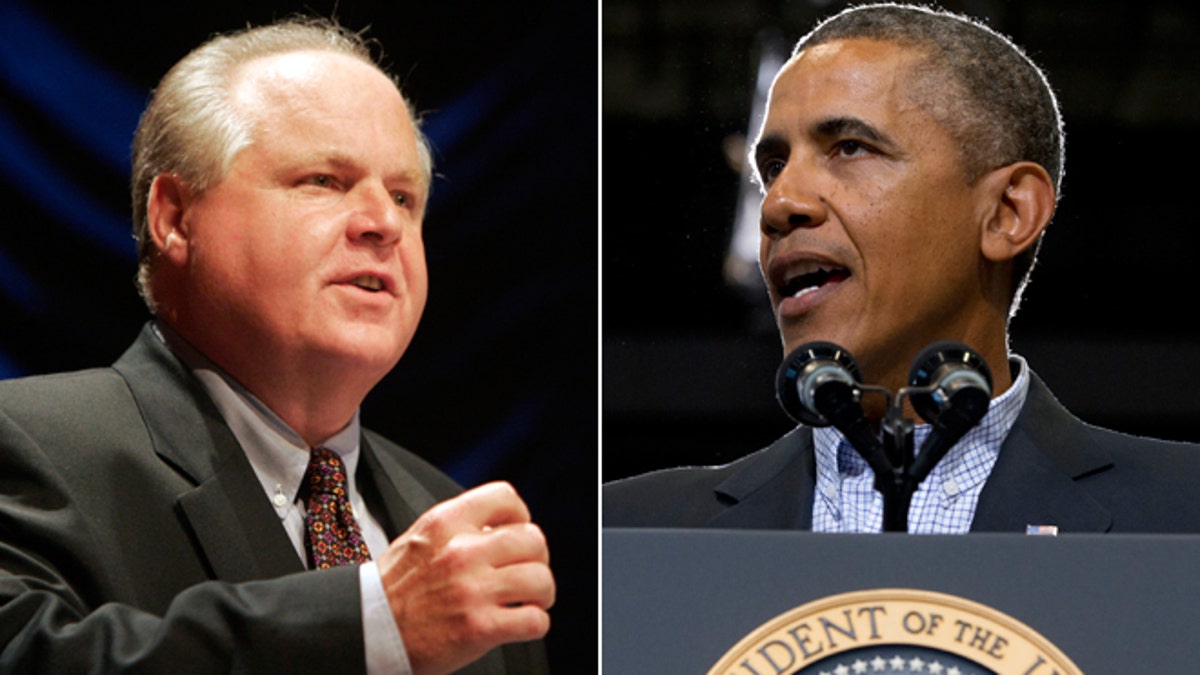
Rush Limbaugh and Barack Obama. (Reuters/AP)
President Obama blamed some of his problems on Rush Limbaugh the other day. And that may not be a brilliant strategy.
In an interview with CNN anchor Chris Cuomo, the president said that some congressional Republicans tell him privately that they believe defunding ObamaCare is a bad idea, but say they are “worried about what Rush Limbaugh is going to say about me on the radio.”
Really? A guy with a microphone is preventing the president of the United States from getting his way on Capitol Hill? Is Rush that powerful?
Cuomo, to his credit, pressed Obama: “How much of the lack of action in Washington do you put on yourself in terms of blame?” he asked. Obama went Trumanesque, saying “the buck stops with me” but that he is “frustrated” by GOP intransigence.
Let’s unpack this a bit. As the nation’s most powerful radio broadcaster, Limbaugh is an unquestioned force on the right. But when Republicans (who probably do want to defund ObamaCare but don’t want the political risks of a government shutdown) invoke him, what they’re really saying is they fear a backlash from conservatives powered by the likes of Limbaugh.
They don’t want a Tea Party primary challenger. They don’t want their fundraising to dry up. They don’t want leading conservative pundits to turn on them.
So Obama was indulging in a bit of shorthand by saying his problem is El Rushbo—and in the process elevated Limbaugh to his level.
Did Limbaugh let that one pass? Not a chance.
“I am the reason he can’t move his agenda forward,” he proclaimed to listeners, “which of course is silly because he’s getting everything he wants. He blamed me again. I mean, it’s like a broken record.” Limbaugh’s analysis is that “nobody is listening to Obama anymore.” (For the record, he insisted that “the Republicans are not listening to me!”)
Limbaugh, who just signed a new three-year deal with his distributors at Cumulus, turned this into a victory lap, Weeks ago “you couldn’t turn on the Drive-By Media without reading that I was finished,” and now here’s the president swiping at him.
Bill Clinton made the same mistake. In the early 1990s, when Limbaugh was not yet the dominant radio force he is today, Clinton complained about how Rush had three hours a day to say whatever he wanted about the White House. Then they got into it over whether Limbaugh had helped create a climate of fear before the Oklahoma City bombing.
No president should lose sight of the fact that he has the biggest megaphone of all.
Marissa Courting Katie
Will Katie Couric soon be yahooing?
All Things D’s Kara Swisher, who has Yahoo pretty well wired, reports that the longtime anchor could launch a Web interview show on Yahoo’s home page—at least if CEO Marissa Mayer has her way.
Katie, who’s in the second year of her daytime talk show, is already web-savvy, having turned herself into a major force on Twitter. Her show is syndicated by ABC, which already has a major web partnership with Yahoo.
Getting Couric would be a coup for Mayer, and would add to the sense that she’s engineering a turnaround at the long-troubled web portal. Yahoo has just topped Google on the number of monthly searches, which stunned a lot of people, including me.
Did ESPN Blink?
The New York Times thinks so.
The sports network has pulled out of a 15-month investigative effort with PBS’s Frontline on the subject of head injuries in the NFL. And the Times, citing two unnamed sources, says ESPN bowed to pressure from the league.
ESPN, owned by Disney, pays more than a billion dollars a year to carry Monday Night Football.
Both sides deny any pressure, although the league conveyed its concerns at what was described as a combative meeting including NFL Commissioner Roger Goodell and ESPN President John Skipper.
An ESPN spokesman says it came down to a disagreement with Frontline over editorial control—although the PBS show says the ground rules were clear from the beginning.
The incident underscores a problem for ESPN, and other networks that carry sports: They are trying to cover a major institution on which they also depend for revenue and ratings.
The Failures of 1963
This "Meet the Press" panel turned in a sad performance in questioning Martin Luther King on the eve of the march on Washington. The white journalists were more concerned with the possibility of violence, communist connections, “Negroes pushing too fast” and the need for “moderation” than they were in asking about progress on civil rights.
And the Washington Post made a historic mistake, as former managing editor Robert Kaiser writes, in failing to mention King’s “I Have a Dream” language, but for one brief reference, in a speech that still resonates a half century later.




